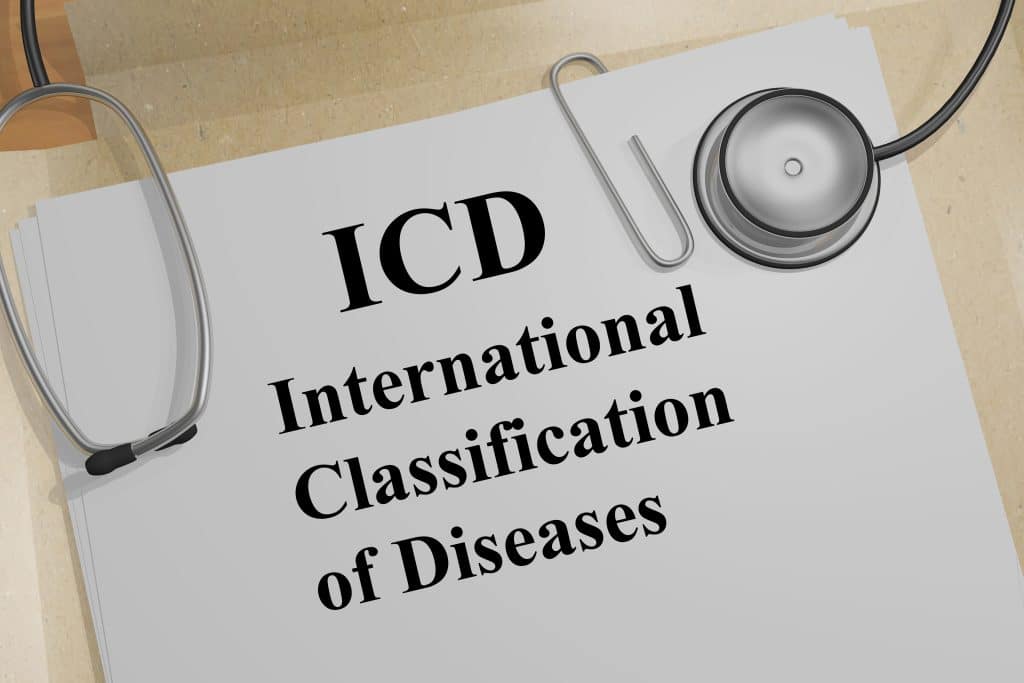ICD is the International Classification of Diseases and was created by the World Health Organization. ICD -10, or ICD-10-CM, is the Tenth Revision, Clinical Modification. These codes are a system used by healthcare providers and physicians to code the diagnosis and conditions in conjunction with doctor’s offices and hospital care.
The ICD-10-CM system gives both providers, coders, and other healthcare professionals detailed information about the diagnosis or conditions of patients. The codes themselves are not usually for patients to know or understand, but only for communication between providers and the insurance companies.
Every letter and number in an ICD code represents a meaning. For example, the letter “K00-K95” is for diseases of the digestive system. These are then broken up into smaller groups for specific regions:
- K40 – K46: Hernia
- K50 – K52: Noninfective enteritis and colitis
- K70 – K77: Diseases of liver
- K80 – K87 Disorders of gallbladder, biliary tract and pancreas
The first three characters of the ICD-10 code categorizes the injury, while the fourth through sixth characters give details to the cause, location, and even severity of it. Sometimes there is a seventh letter for a late effect treatment encounter.
The ICD-10 for Rectal Bleeding refers to the code to denote rectal bleeding. The ICD-10 code for rectal bleeding is K62.5. Using this code means you have bleeding in your rectum or anal canal, both of which are considered the last portion of the intestines.
You may hear your doctor refer to your condition as rectal bleeding or anal bleeding.
You may also hear this when speaking to insurance companies or other medical professionals. It is a term used to identify your current diagnosis, but it is not the name of the condition itself. Rectal bleeding could be caused by a number of conditions.
What Does the ICD-10-CM Code for Rectal Bleeding mean?

The official code for rectal bleeding according to the ICD-10-CM is K62.5 and refers to a hemorrhage of the rectum or anus. It includes the anal canal and rectum, but excludes gastrointestinal bleeding, hemorrhoids, fecal occult blood, fecal incontinence, and colostomy malfunction. The ICD-10-CM code K62.5 may also be used for other terms such as anal margin hematoma, anal verge finding, anorectal pain, bleeding from anus, and hematoma of anus, among others.
ICD-10 K62.5 Rectal Bleeding for Patients
As a patient, it is good to familiarize yourself with the different codes that are used in medical billing. If you come across K62.5, it means you as the patient had bleeding of the rectum or anus. The amount of bleeding can vary from person to person. Often it is obvious, but sometimes you may need to have a lab test to confirm.
Symptoms of anal bleeding in the lower digestive tract include:
- Black or tarry stool
- Stool mixed with bright red blood
- Stool mixed with dark red blood
- Bright red blood on the toilet paper or dripping into the bowl.
If the bleeding is occurring in the upper digestive tract, you may have the following symptoms in addition to the ones above:
- Vomit that looks like coffee ground
- Bright red blood in vomit
What to Do if You Have Rectal Bleeding

Rectal bleeding is a symptom of something in your body that needs evaluation. Bright red bleeding is usually benign, however cancer can be a cause. Some causes of rectal bleeding include hemorrhoids, anal fissures, rectal or anal polyps, proctitis, sexually transmitted infections or cancer (anal or rectal).
Rectal or anal bleeding, ICD-10 K62.5 is an indication for a colonoscopy if one has not previously been performed. In many instances, the bright red bleeding is from hemorrhoids, however; many patients undergoing a colonoscopy for bright red bleeding have precancerous polyps removed during the colonoscopy which is life saving. Ironic how hemorrhoid bleeding can save a life.
If you suspect you have rectal or anal bleeding or are experiencing one or more of the conditions listed above, speak to a proctologist who can examine you and help determine the cause.

